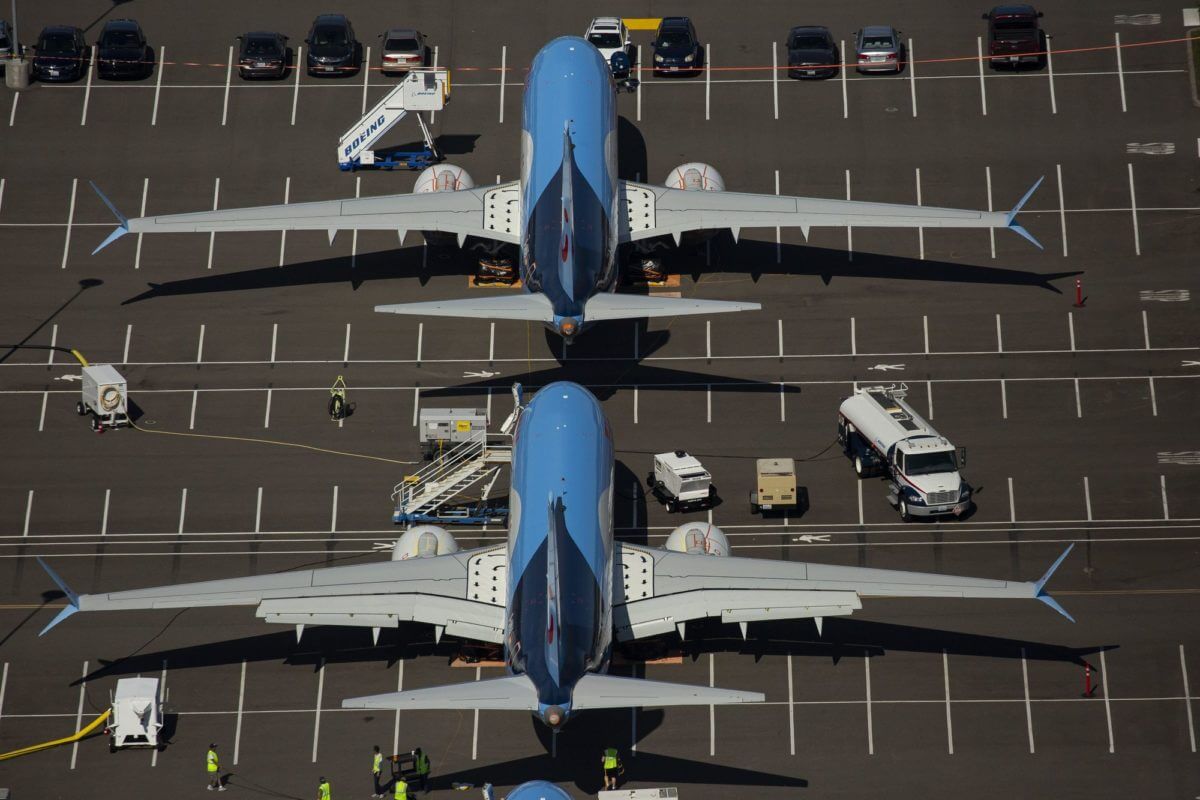
Boeing is an aviation nightmare right now. Can the company ever get back on track? Analysts are divided. | Image: David Ryder / GETTY IMAGES NORTH AMERICA / AFP
- Boeing lost its title as world’s largest plane maker after delivering only 380 jets and having negative orders for commercial jets in 2019.
- The company expects future losses of more than $18 billion tied to the ongoing Boeing 737 Max saga.
- Wall Street analysts have updated their ratings amid the nearly year-long grounding of the 737 Max.
For years, Boeing (NYSE: BA) was one of the most respected American industrial and defense companies. Those days are long gone.
Last year, the business found itself in the spotlight for all the wrong reasons. Its Boeing 737 MAX made more headlines than it had flights. The company’s once rock-solid image got destroyed, with investors running for the exit.
Can Boeing stock get away with this mess?
Boeing Stock Was Once Stellar
Founded over a century ago, Boeing had been on a long and fairly steady upward trend. This was reflected in its share price:
Historical BA price chart. | Source: Yahoo Finance
After falling from $107.83 to $29.05 during the Great Recession, the BA share price has soared in value. In January 2017, Boeing broke through the $158 resistance level.
Following the Lion Air crash in October 2018, BA dipped once again only to reach new highs in the first two months of 2019. The stock hit a record high of $446.01 on March 1 of that year.
The company reported mind-boggling results for its Q4 of 2018. Its earnings of $5.48 per share smashed analysts’ estimates of $4.57. Moreover, the company brought in $101.1 billion in annual revenue — the first time it has ever gone above a $100 billion mark.
Boeing delivered 806 aircraft and expected to break that record in 2019. We all know what happened next.
It Went From 100 To 0 Real Quick
News of a second fatal 737 Max 8 crash in under five months led to a massive drop in Boeing’s stock price. What was once the company’s bestselling jet now remains grounded for over 11 months.
While Boeing initially expected to have its 737 Max planes up and running again by March, those plans have been pushed back to mid-2020.
Meanwhile, large airlines like Southwest (NYSE: LUV) and American Airlines (NASDAQ: AAL) have already removed the jet from their schedules through early June.
The company is considering further cuts on its 787 production. The number might be slashed from 14 to ten aircraft per month, partially due to slowing demand in China – one of the largest buyer of the jets.
The company is grappling with a worsening PR crisis and billions of dollars’ worth of lost orders. Boeing estimated its total future losses associated with the grounding to surpass $18 billion.
Boeing’s decision to appoint a new CEO was the nail in the coffin for a dreadful 2019. On Dec. 23, Dennis Muilenburg was ousted amid criticism of his handling of the 737 Max crisis. David Calhoun took over as CEO on Jan. 13.
Is It Really That Bad?
According to its latest financial report, Boeing lost $636 million in 2019, marking the company’s first annual loss since 1997. It delivered only 380 jets and had negative orders for commercial jets.
Boeing didn’t have a single order in January 2020.
Its defense business is also facing troubles. The company had to halt the KC-46 tanker deliveries repeatedly after debris was found in closed compartments.
Due to decreased deliveries, the company’s key rival Airbus has taken the lead as the world’s largest jet producer.
The company’s stock has been wobbling in a downtrend for the past year.
One-year BA price chart. | Source: Yahoo Finance
Can 2020 Be Even Worse?
A few analysts tried to look past the company’s current headwinds to predict what the nearest future may hold for Boeing stock.
Credit Suisse raised its price target on Boeing stock from $321 to $367, saying the company is finally entering a “positive news period”:
As far as the MAX is concerned, BA sees similar longer-term unit cash profitability compared to prior, while BA is also trying to front-end as much of the cash impact as possible. Consensus in the room was that 2023 could be a near-normal cash year, where production/deliveries would normalize while concessions would become largely immaterial.
However, analyst Robert Spingarn stopped short of recommending shares.
Peter Arment, an analyst at Baird, said Boeing’s customer compensation and program costs are “front-loaded,” likely leaving 2022 as “the first true clean year, and it will take until 2023 to get back to 52 [Max jets] per month.”
He rated Boeing stock as a Hold, with a $322 price target.
On the other hand, Benchmark analyst Josh Sullivan rated the stock as a Buy with a $375 price target. He believes investors should buy now, before Max jets start carrying passengers again.
Here are some of the latest ratings provides by several analysts:
Boeing analyst rating history, | Source: Marketbeat.com
Online service Walletinvestor.com predicted BA stock to gradually surge, hitting $571.68 by February 2025. This is what its one-year price forecast looks like:
BA price predictions for 2020. | Source: Walletinvestor.com
Amid ongoing uncertainty, investors are waiting for new 737 Max developments with bated breath. And while the company’s position in the market is anything but certain, Delta CEO Ed Bastian advised Boeing to “not lose sight of the future.”
Disclaimer: The opinions expressed in this article do not necessarily reflect the views of CCN.com.
This article was edited by Sam Bourgi.






